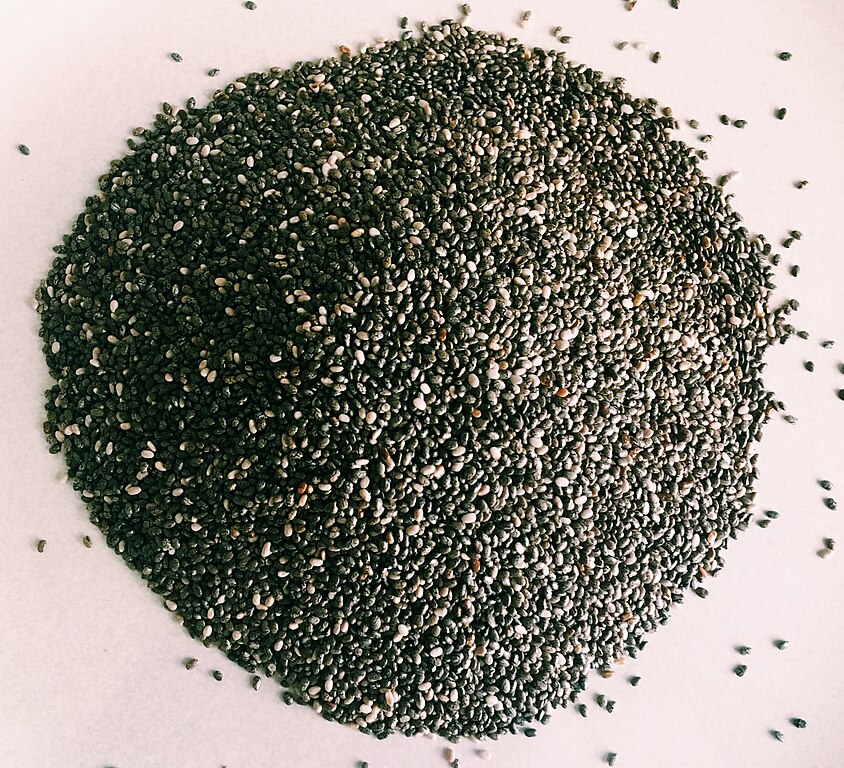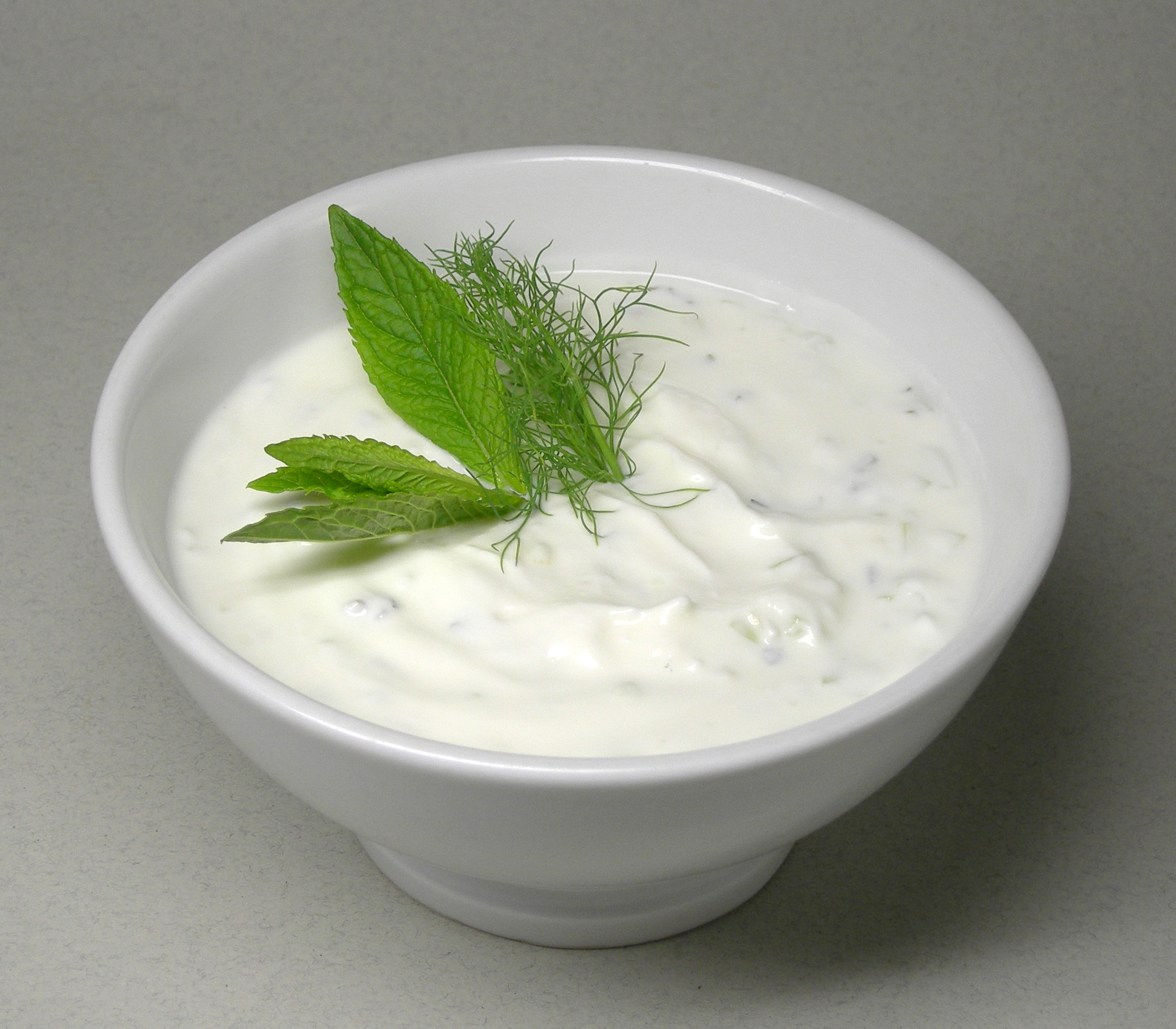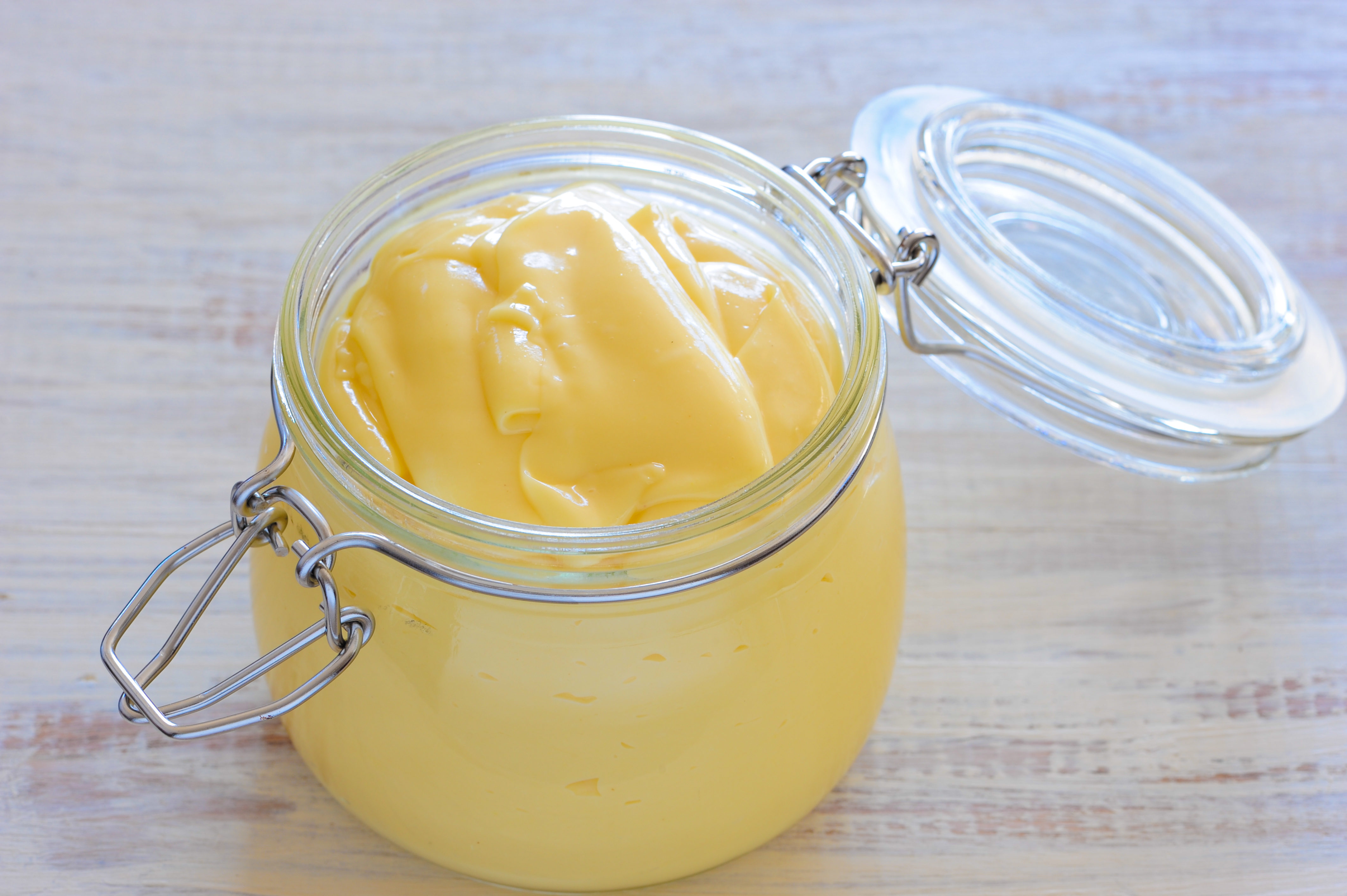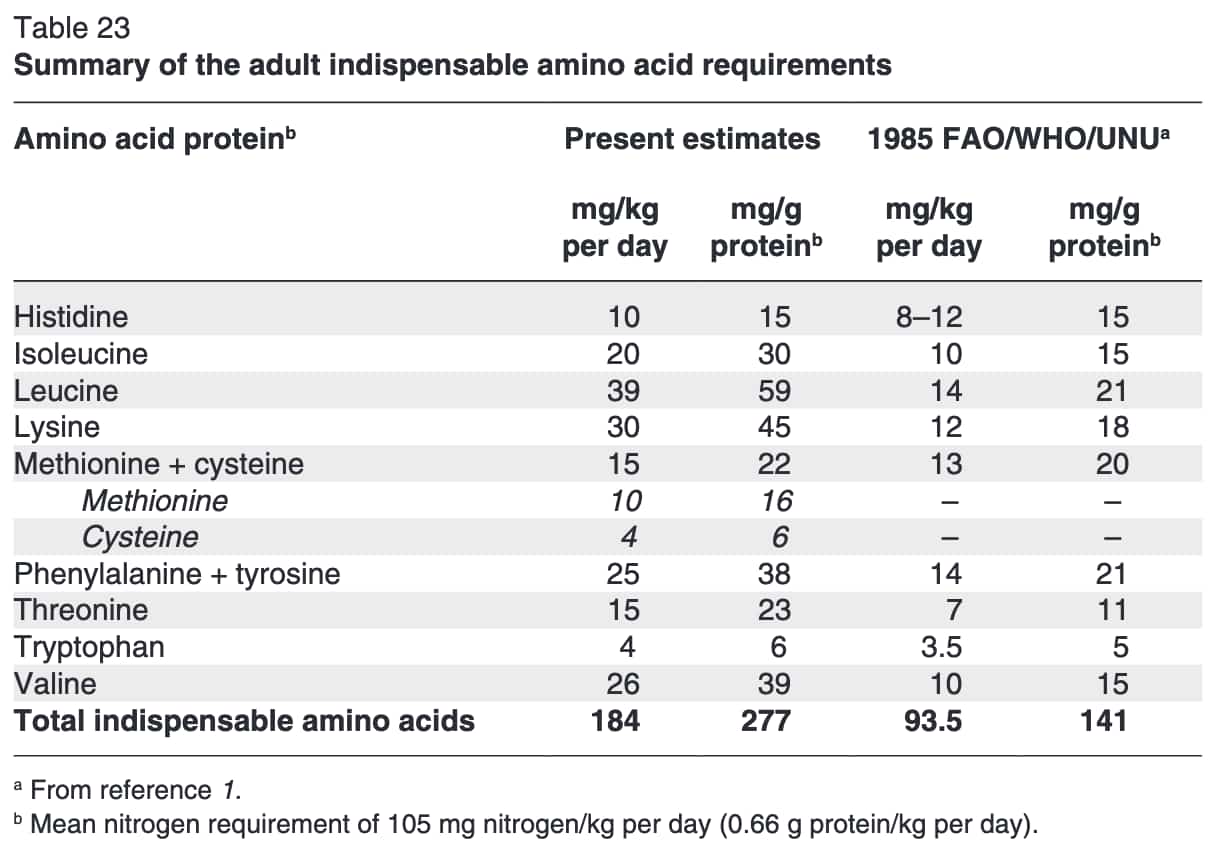16 Complete Protein Pairings with Peanuts
Summary:
- Peanut is low in protein - about 35.6 grams per cup.
- In addition, peanut provides only 7 of the 9 essential amino acids sufficiently - it is a little low on lysine and methionine.[1]
- Peanut pairs well with carrots, crimini mushroom, pumpkin seeds, chia seeds or hedge mustard seeds to create a complete protein profile. [2] More peanut pairings and detailed analysis below.
A complete protein is a protein source that "contains adequate proportions of the nine essential amino acids" that our body can not produce on its own.
We analyzed the amino acid composition of peanuts, and found both vegan and vegetarian pairings with peanuts that creates a complete protein profile. Read on to discover new combinations of foods to enjoy!
Details on how we calculate complete protein profiles.
Amount of Protein in Peanuts
Relatively low in protein, a single cup of peanuts contains 35.6 grams of protein, or about 71% of recommended daily values. [1]
To get the adequate amount of protein with peanuts alone, you will need 1.4 cups of peanuts (205 grams) for an average female, or 1.7 cups of peanuts for males. [4] That's over 1210 calories. Pairing peanut with a richer protein source is a good idea.
Full nutritional profile for peanuts
USDA Source: Peanuts, all types, dry-roasted, without salt
Macronutrients in 1 cup (146g) of peanuts:
| % of RDV | Amount | ||
| Calories |
|
42.9% | 857 kCal |
| Carbohydrates |
|
0% | - |
| Total fat |
|
113.3% | 72.5 grams |
| Protein |
|
71.1% | 35.6 grams |
Essential Amino Acids in Peanuts
Proportionally, peanut does contain abundant amounts of 7 out of the nine essential amino acids. However, peanut is a little short on lysine and methionine.[1]
To have adequate amounts of all nine essential amino acids with peanut alone, you will have to eat 2 cups of peanuts (296 grams) for an average person. [2]
That's about 44% more peanut to compensate for the lack of lysine and methionine, compared to the protein requirement alone.
The amount of each essential amino acid in 1 cup (146g) of peanuts:
| Amino Acid | % of RDV [2] | Amount [1] |
Complete / Adequate |
|
| Protein |
|
71.1% | 35.551g | |
| Histidine |
|
138.8% | 0.875g | |
| Isoleucine |
|
141.4% | 1.216g | |
| Leucine |
|
118.6% | 2.241g | |
| Lysine |
|
72.6% | 1.241g | |
| Methionine |
|
49.4% | 0.425g | |
| Phenylalanine |
|
120.2% | 1.791g | |
| Threonine |
|
131.6% | 1.184g | |
| Tryptophan |
|
129.2% | 0.336g | |
| Valine |
|
134.2% | 1.45g |
More Complete Protein with Peanuts
- Carrots
- Crimini Mushroom
- Pumpkin Seeds
- Chia Seeds
- Hedge Mustard Seeds
- Yellow Mustard
- Dijon Mustard
- Avocado
- Wheat Germ
- Chestnut
- Lotus Seeds
Vegan 1. Carrots and Peanuts


Low in protein, carrot is high in lysine and methionine, which is complementary to peanut.
A ratio of 1.1 tablespoons of peanuts (10g) and 2.7 carrots (193g) creates a complete protein profile. In fact, any ratio of more than 19:1 of carrot to peanut will be complete.
Full nutritional profile for carrots
USDA Source: Carrots, raw
| Amino Acid | % of RDV [2] | Amount [5] |
Complete / Adequate |
|
| Protein |
|
8.4% | 4.2g | |
| Histidine |
|
21.7% | 0.14g | |
| Isoleucine |
|
26.9% | 0.23g | |
| Leucine |
|
18.5% | 0.35g | |
| Lysine |
|
16.4% | 0.28g | |
| Methionine |
|
7.9% | 0.07g | |
| Phenylalanine |
|
16.1% | 0.24g | |
| Threonine |
|
50% | 0.45g | |
| Tryptophan |
|
17.7% | 0.05g | |
| Valine |
|
21.5% | 0.23g |
Vegan 2. Crimini Mushroom and Peanuts


Crimini mushroom is a reasonable source of supplementary protein, and is high in lysine and methionine, complementing the profile of peanut.
For example, 1.5 tablespoons of peanuts (14g) and 2 cups of crimini mushroom (173g) make a complete amino acids profile. In fact, any ratio of more than 12:1 of crimini mushroom to peanut will be complete.
Full nutritional profile for crimini mushroom
USDA Source: Mushrooms, brown, italian, or crimini, raw
| Amino Acid | % of RDV [2] | Amount [6] |
Complete / Adequate |
|
| Protein |
|
15.4% | 7.7g | |
| Histidine |
|
31.6% | 0.2g | |
| Isoleucine |
|
33.4% | 0.29g | |
| Leucine |
|
25.3% | 0.48g | |
| Lysine |
|
32.4% | 0.55g | |
| Methionine |
|
14.4% | 0.12g | |
| Phenylalanine |
|
22.7% | 0.34g | |
| Threonine |
|
34.3% | 0.31g | |
| Tryptophan |
|
49.6% | 0.13g | |
| Valine |
|
31.2% | 0.34g |
Vegan 3. Pumpkin Seeds and Peanuts


A reasonable source of supplementary protein, pumpkin seed is high in lysine and methionine, which is complementary to peanut.
A ratio of 2.6 tablespoons of peanuts (24g) and 0.3 cup of pumpkin seeds (20g) creates a complete protein profile. In fact, any ratio of more than 0.8:1 of pumpkin seed to peanut will be complete.
Full nutritional profile for pumpkin seeds
USDA Source: Seeds, pumpkin and squash seeds, whole, roasted, without salt
| Amino Acid | % of RDV [2] | Amount [7] |
Complete / Adequate |
|
| Protein |
|
19% | 9.5g | |
| Histidine |
|
38.9% | 0.25g | |
| Isoleucine |
|
45.1% | 0.39g | |
| Leucine |
|
35.9% | 0.68g | |
| Lysine |
|
27.9% | 0.48g | |
| Methionine |
|
17.7% | 0.15g | |
| Phenylalanine |
|
32% | 0.48g | |
| Threonine |
|
36.6% | 0.33g | |
| Tryptophan |
|
46% | 0.12g | |
| Valine |
|
49.3% | 0.53g |
Vegan 4. Chia Seeds and Peanuts


Chia seed is a reasonable source of supplementary protein, and is high in lysine and methionine, complementing the profile of peanut.
For example, 2 tablespoons of peanuts (18g) and 0.7 ounce of chia seeds (20g) make a complete amino acids profile. In fact, any ratio of more than 1.1:1 of chia seed to peanut will be complete.
Full nutritional profile for chia seeds
USDA Source: Seeds, chia seeds, dried
| Amino Acid | % of RDV [2] | Amount [8] |
Complete / Adequate |
|
| Protein |
|
15.5% | 7.8g | |
| Histidine |
|
34.3% | 0.22g | |
| Isoleucine |
|
36.4% | 0.31g | |
| Leucine |
|
29.4% | 0.56g | |
| Lysine |
|
20.5% | 0.35g | |
| Methionine |
|
20% | 0.17g | |
| Phenylalanine |
|
28.8% | 0.43g | |
| Threonine |
|
32.3% | 0.29g | |
| Tryptophan |
|
50% | 0.13g | |
| Valine |
|
34.5% | 0.37g |
Vegan 5. Hedge Mustard Seeds and Peanuts


A reasonable source of supplementary protein, hedge mustard seed is high in lysine and methionine, which is complementary to peanut.
A ratio of 2.9 tablespoons of peanuts (27g) and 0.3 cup of hedge mustard seeds (25g) creates a complete protein profile. In fact, any ratio of more than 1:1 of hedge mustard seed to peanut will be complete.
Full nutritional profile for hedge mustard seeds
USDA Source: Seeds, sisymbrium sp. seeds, whole, dried
| Amino Acid | % of RDV [2] | Amount [9] |
Complete / Adequate |
|
| Protein |
|
19.1% | 9.5g | |
| Histidine |
|
38.3% | 0.24g | |
| Isoleucine |
|
44.9% | 0.39g | |
| Leucine |
|
38.1% | 0.72g | |
| Lysine |
|
25.2% | 0.43g | |
| Methionine |
|
18.1% | 0.16g | |
| Phenylalanine |
|
31.8% | 0.47g | |
| Threonine |
|
43.4% | 0.39g | |
| Tryptophan |
|
49.4% | 0.13g | |
| Valine |
|
41% | 0.44g |
Vegan 6. Yellow Mustard and Peanuts


Yellow mustard is a reasonable source of supplementary protein, and is high in lysine and methionine, complementing the profile of peanut.
For example, 2.6 tablespoons of peanuts (24g) and 9.7 tablespoons of yellow mustard (146g) make a complete amino acids profile. In fact, any ratio of more than 6:1 of yellow mustard to peanut will be complete.
Full nutritional profile for yellow mustard
USDA Source: Mustard, prepared, yellow
| Amino Acid | % of RDV [2] | Amount [10] |
Complete / Adequate |
|
| Protein |
|
22.4% | 11.2g | |
| Histidine |
|
49.9% | 0.31g | |
| Isoleucine |
|
47.5% | 0.41g | |
| Leucine |
|
41.7% | 0.79g | |
| Lysine |
|
34.2% | 0.59g | |
| Methionine |
|
20.8% | 0.18g | |
| Phenylalanine |
|
35.1% | 0.52g | |
| Threonine |
|
48.3% | 0.43g | |
| Tryptophan |
|
25.9% | 0.07g | |
| Valine |
|
47.2% | 0.51g |
Vegan 7. Dijon Mustard and Peanuts


A great source of protein, dijon mustard is high in lysine and methionine, which is complementary to peanut.
A ratio of 1.8 tablespoons of peanuts (16g) and 4.1 tablespoons of dijon mustard (25g) creates a complete protein profile. In fact, any ratio of more than 1.5:1 of dijon mustard to peanut will be complete.
Full nutritional profile for dijon mustard
USDA Source: Spices, mustard seed, ground
| Amino Acid | % of RDV [2] | Amount [11] |
Complete / Adequate |
|
| Protein |
|
20.8% | 10.4g | |
| Histidine |
|
50% | 0.31g | |
| Isoleucine |
|
49.8% | 0.43g | |
| Leucine |
|
40.5% | 0.76g | |
| Lysine |
|
34.8% | 0.59g | |
| Methionine |
|
19.4% | 0.17g | |
| Phenylalanine |
|
32.9% | 0.49g | |
| Threonine |
|
37.7% | 0.34g | |
| Tryptophan |
|
38.7% | 0.1g | |
| Valine |
|
49.6% | 0.54g |
Vegan 8. Avocado and Peanuts


Avocado is low in protein, and is high in lysine and methionine, complementing the profile of peanut.
For example, 2.1 tablespoons of peanuts (19g) and 2.4 avocado (328g) make a complete amino acids profile. In fact, any ratio of more than 18:1 of avocado to peanut will be complete.
Full nutritional profile for avocado
USDA Source: Avocados, raw, California
| Amino Acid | % of RDV [2] | Amount [12] |
Complete / Adequate |
|
| Protein |
|
22% | 11g | |
| Histidine |
|
42.8% | 0.27g | |
| Isoleucine |
|
49.7% | 0.43g | |
| Leucine |
|
39.7% | 0.75g | |
| Lysine |
|
34% | 0.58g | |
| Methionine |
|
20.5% | 0.18g | |
| Phenylalanine |
|
36.3% | 0.54g | |
| Threonine |
|
43.1% | 0.39g | |
| Tryptophan |
|
48.2% | 0.13g | |
| Valine |
|
49.1% | 0.53g |
Vegan 9. Wheat Germ and Peanuts


A great source of protein, wheat germ is high in lysine and methionine, which is complementary to peanut.
A ratio of 2.4 tablespoons of peanuts (21g) and 3.5 tablespoons of wheat germ (25g) creates a complete protein profile. In fact, any ratio of more than 1.2:1 of wheat germ to peanut will be complete.
Full nutritional profile for wheat germ
USDA Source: Wheat germ, crude
| Amino Acid | % of RDV [2] | Amount [13] |
Complete / Adequate |
|
| Protein |
|
22% | 11g | |
| Histidine |
|
45.9% | 0.29g | |
| Isoleucine |
|
45.4% | 0.39g | |
| Leucine |
|
38.2% | 0.72g | |
| Lysine |
|
32.1% | 0.55g | |
| Methionine |
|
20.5% | 0.18g | |
| Phenylalanine |
|
33.2% | 0.5g | |
| Threonine |
|
46.2% | 0.42g | |
| Tryptophan |
|
49.4% | 0.13g | |
| Valine |
|
47.4% | 0.51g |
Vegan 10. Chestnut and Peanuts


Chestnut is a reasonable source of supplementary protein, and is high in lysine and methionine, complementing the profile of peanut.
For example, 3 tablespoons of peanuts (27g) and 1 cup of chestnut (148g) make a complete amino acids profile. In fact, any ratio of more than 5:1 of chestnut to peanut will be complete.
Full nutritional profile for chestnut
USDA Source: Nuts, chestnuts, european, roasted
| Amino Acid | % of RDV [2] | Amount [14] |
Complete / Adequate |
|
| Protein |
|
22.6% | 11.3g | |
| Histidine |
|
46.4% | 0.29g | |
| Isoleucine |
|
47.7% | 0.41g | |
| Leucine |
|
36.7% | 0.69g | |
| Lysine |
|
29.7% | 0.51g | |
| Methionine |
|
22.1% | 0.19g | |
| Phenylalanine |
|
35.6% | 0.53g | |
| Threonine |
|
42.9% | 0.39g | |
| Tryptophan |
|
43.8% | 0.11g | |
| Valine |
|
49.3% | 0.53g |
Vegan 11. Lotus Seeds and Peanuts


A reasonable source of supplementary protein, lotus seed is high in lysine and methionine, which is complementary to peanut.
A ratio of 1 tablespoon of peanuts (9g) and 1.4 cups of lotus seeds (45g) creates a complete protein profile. In fact, any ratio of more than 5:1 of lotus seed to peanut will be complete.
Full nutritional profile for lotus seeds
USDA Source: Seeds, lotus seeds, dried
| Amino Acid | % of RDV [2] | Amount [15] |
Complete / Adequate |
|
| Protein |
|
18.3% | 9.2g | |
| Histidine |
|
39.4% | 0.25g | |
| Isoleucine |
|
48.8% | 0.42g | |
| Leucine |
|
36.3% | 0.69g | |
| Lysine |
|
30.5% | 0.52g | |
| Methionine |
|
17% | 0.15g | |
| Phenylalanine |
|
30.7% | 0.46g | |
| Threonine |
|
45.6% | 0.41g | |
| Tryptophan |
|
46.2% | 0.12g | |
| Valine |
|
49.7% | 0.54g |
Vegetarian 12. Sour Cream and Peanuts


Sour cream is a reasonable source of supplementary protein, and is high in lysine and methionine, complementing the profile of peanut.
For example, 3.7 tablespoons of peanuts (34g) and 0.5 cup of sour cream (87g) make a complete amino acids profile. In fact, any ratio of more than 2.6:1 of sour cream to peanut will be complete.
Full nutritional profile for sour cream
USDA Source: Cream, sour, cultured
| Amino Acid | % of RDV [2] | Amount [16] |
Complete / Adequate |
|
| Protein |
|
20.8% | 10.4g | |
| Histidine |
|
44.9% | 0.28g | |
| Isoleucine |
|
49.3% | 0.42g | |
| Leucine |
|
42.3% | 0.8g | |
| Lysine |
|
30.8% | 0.53g | |
| Methionine |
|
19.4% | 0.17g | |
| Phenylalanine |
|
37.1% | 0.55g | |
| Threonine |
|
44.3% | 0.4g | |
| Tryptophan |
|
44% | 0.11g | |
| Valine |
|
46.9% | 0.51g |
Vegetarian 13. Caramel and Peanuts


Low in protein, caramel is high in lysine and methionine, which is complementary to peanut.
A ratio of 3.5 tablespoons of peanuts (32g) and 0.5 cup of caramel (179g) creates a complete protein profile. In fact, any ratio of more than 6:1 of caramel to peanut will be complete.
Full nutritional profile for caramel
USDA Source: Toppings, butterscotch or caramel
| Amino Acid | % of RDV [2] | Amount [17] |
Complete / Adequate |
|
| Protein |
|
19.8% | 9.9g | |
| Histidine |
|
41.6% | 0.26g | |
| Isoleucine |
|
49.3% | 0.42g | |
| Leucine |
|
39.4% | 0.74g | |
| Lysine |
|
28% | 0.48g | |
| Methionine |
|
18.4% | 0.16g | |
| Phenylalanine |
|
34.7% | 0.52g | |
| Threonine |
|
41.7% | 0.38g | |
| Tryptophan |
|
28.1% | 0.07g | |
| Valine |
|
45.4% | 0.49g |
Vegetarian 14. Yogurt and Peanuts


Yogurt is a reasonable source of supplementary protein, and is high in lysine and methionine, complementing the profile of peanut.
For example, 3.6 tablespoons of peanuts (33g) and 0.3 cup of yogurt (71g) make a complete amino acids profile. In fact, any ratio of more than 2.1:1 of yogurt to peanut will be complete.
Full nutritional profile for yogurt
USDA Source: Yogurt, plain, whole milk
| Amino Acid | % of RDV [2] | Amount [18] |
Complete / Adequate |
|
| Protein |
|
21.1% | 10.5g | |
| Histidine |
|
41.3% | 0.26g | |
| Isoleucine |
|
47.8% | 0.41g | |
| Leucine |
|
40.1% | 0.76g | |
| Lysine |
|
29.4% | 0.5g | |
| Methionine |
|
19.7% | 0.17g | |
| Phenylalanine |
|
36.3% | 0.54g | |
| Threonine |
|
41.1% | 0.37g | |
| Tryptophan |
|
34.9% | 0.09g | |
| Valine |
|
49.4% | 0.53g |
Vegetarian 15. Mayonnaise and Peanuts


Low in protein, mayonnaise is high in lysine and methionine, which is complementary to peanut.
A ratio of 3.3 tablespoons of peanuts (30g) and 1.2 cups of mayonnaise (262g) creates a complete protein profile. In fact, any ratio of more than 9:1 of mayonnaise to peanut will be complete.
Full nutritional profile for mayonnaise
USDA Source: Salad dressing, mayonnaise, regular
| Amino Acid | % of RDV [2] | Amount [19] |
Complete / Adequate |
|
| Protein |
|
19.8% | 9.9g | |
| Histidine |
|
39.7% | 0.25g | |
| Isoleucine |
|
49.3% | 0.42g | |
| Leucine |
|
37.9% | 0.72g | |
| Lysine |
|
26.2% | 0.45g | |
| Methionine |
|
21% | 0.18g | |
| Phenylalanine |
|
35.1% | 0.52g | |
| Threonine |
|
43.4% | 0.39g | |
| Tryptophan |
|
44% | 0.11g | |
| Valine |
|
45.9% | 0.5g |
